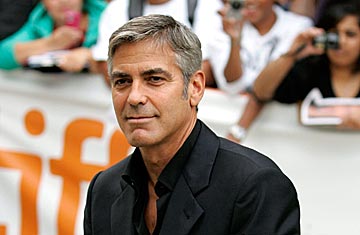
George Clooney arrives at the premiere for The Men Who Stare at Goats
Actors are salesmen. Stories, characters, movies are their product, and their physicality is the seductive packaging. That makes movie stars the industry's supersalesmen. And no one closes a deal with more assurance or grace than George Clooney. Not that all his pictures are blockbusters. Since A Perfect Storm in 2000, only the Ocean's (Eleven, Twelve, Thirteen) capers have topped $100 million at the domestic box office. But Clooney — handsome and affable, and blessed with a wit that can charm and cut — is surely the modern idea and ideal of stardom. Other celebrities seem tortured by public attention; Clooney bathes in it. He loves making the sale.
This time of year, the salesman goes on the road to showcase his new wares at the Venice and Toronto film festivals. He showed up last week on the Lido, a couple of hundred miles from his vacation villa on Lake Como, both to present his Iraq war comedy The Men Who Stare at Goats and to unveil his new inamorata, TV presenter Elisabetta Canalis. When the film broke down at the evening screening, Clooney serenaded the audience with a comic-opera rendition of O Sole Mio that wouldn't make Placido Domingo envious but did wow the crowd. This weekend he's in Toronto with two films, Goats and Jason Reitman's Up in the Air — which, to end the suspense right here, is one of the festival's and the year's best movies. At a press conference yesterday, when asked why he doesn't have a Facebook page, Clooney smilingly answered, "I'd rather have a prostate exam on live TV by a guy with very cold hands."
There shouldn't be that many paying customers for Goats, which opens commercially Nov. 6. It's based on Jon Ronson's book about the U.S. military's secret "remote viewing" missions, in which soldiers were trained as "psychic spies." With the proper concentration and intuition, men could run through walls, or, as one GI explains, "kill animals just by staring at them." Clooney plays Lyn Cassady, a vaunted veteran of the program, who's trying to harness his superpowers for the allied superpowers in the early days of the Iraq adventure. His student and dupe is Bob Wilton (Ewan McGregor), a naive journalist trying to get a scoop for his Midwestern newspaper. Cassady tells him of the time he used an ancient Chinese maneuver, the Death Touch, on an adversary. And was the man killed instantly? "No, he died eight years later. That's the thing about the Death Touch — you never know when it'll take effect."
Is this fact or fantasy? At the beginning of the film, we are told, "More of this is true than you would believe." And as a military device, remote viewing is surely no wackier than detecting weapons of mass destruction in a country that didn't have any. But as written by Peter Straughan (who also connived in the movie botch of the nonfiction book How to Lose Friends & Alienate People) and directed by Grant Heslov (screenwriter on the Clooney-directed Good Night, and Good Luck), Goats strains as hard to find a coherent comic craziness as Cassady does to make clouds part with the force of his mind. Over and over, the movie smashes into the wall of plausibility it's trying to run through.
The difference between Clooney in kooky farces like O Brother, Where Art Thou? and Goats and Clooney in more realistic movies like the Ocean's series and Up in the Air is the intensity of his playing. In the farces, he wears his heroic grin with a subversive idiot twist; his steely-eyed certitude reveals just a flick of lunacy. Otherwise, Clooney is reasonable, understated, channeling his charisma without really trying. When he tamps down the movie-star magic and just lets it seep out, it glows all the brighter.
That's quite a feat in Up in the Air, since his character, Ryan Bingham, is a management consultant hired by other companies to tell their employees they're no longer employed. He's a fire-man; he keeps his job by relieving other people of theirs. And he does so with such ostensible sympathy and sincerity, with helpful suggestions on other lines of work, that the victims often leave the interview not wanting to give Ryan the Death Touch. He's a head chopper acting like a grief counselor.
